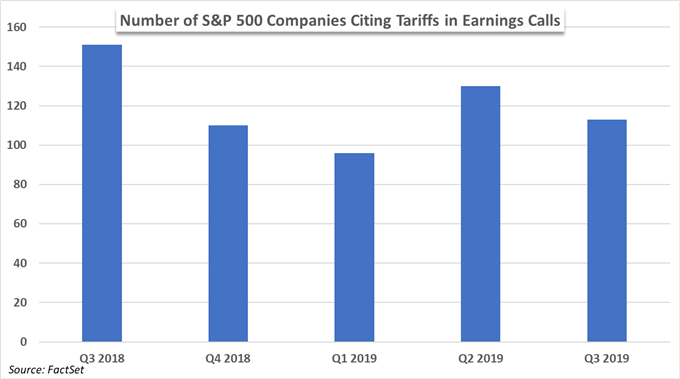Trading Earnings Announcements: Main Talking Points
- Earnings season occurs a few weeks after the final month of a financial quarter and provides unique opportunities for equity traders
- It can result in immense single-stock volatility that has potential to spill over into other companies, sectors and the major indices
- This guide will cover three key things traders should know when trading earnings season
- Check out DailyFX’s Quarterly Equity Forecast for the Dow Jones, S&P 500, Nasdaq 100 and more
For a quick introduction: Earnings Season: What is it & Why is it Important?
3 Things to Know When Trading Earnings Announcements
Earnings season provides an excellent opportunity for equity traders to gain insight on the standing of their investments and what it may mean for share prices in the coming weeks and months. Further, quarterly results can also result in significant short-term price swings with heightened volatility. Taken together, the implications from a corporation’s quarterly performance can provide a unique trading opportunity, but there are considerations to be made before diving in.
Below are 3 things all traders should consider when trading earnings season
1. Earnings can Create Substantial Volatility, both Implied and Realized
First and foremost, quarterly earnings possess the potential to seriously uproot an ongoing price trend due to their relative infrequency and importance. Given this ability, causes traders to position for severe price swings – evidenced by heightened implied volatility.
Stock Market Basics: A Beginner’s Guide to Trading Stocks
Since it is exceedingly difficult for the average investor to correctly forecast how the company will perform – never mind the eventual impact on its share price – the risk-reward of entering a position immediately prior to a report can be skewed. If your investment vehicle of choice is impacted by implied volatility, the impact on the position can be particularly acute because implied volatility remains high until the results are released but typically collapses quickly afterward resulting in what is known as “IV crush.”
Implied volatility crush is, as the name would suggest, when the implied volatility of a stock drops significantly, usually because the uncertainty has passed. The abrupt reversal in implied volatility is often accompanied by realized volatility, but not always.


Recommended by Peter Hanks
Trading Forex News: The Strategy
The discrepancy between implied and realized volatility allows for some unique trading strategies like straddles and strangles which seek to capitalize on absolute volatility of option contracts or short straddles and strangles which aim to capitalize on IV crush. Apart from option strategies, trading earnings reports is incredibly difficult and risky. Therefore, any position taken should be adequately hedged and include a stop.
2. Results are not Black and White
As it was alluded to in the paragraph prior, the relationship between an earnings result and subsequent price reaction is not always straightforward. Although better-than-expected earnings are typically bullish, they do not always translate to immediate price gains and the opposite holds true as well.
While encouraging, a quarterly report is more than last quarter’s results compared to expectations. Indeed, analysts are often much more concerned with the future expectations of the firm as price is a forward looking metric, with future earnings being calculated in current prices.
With that in mind, it becomes more reasonable when investors shy away from a stock with strong results for the past quarter, but an abysmal outlook for the future. A weaker outlook can seriously undercut a stock’s current valuation, regardless of past performance, a fact that is realized all too often during earnings season.
How to Value a Stock: A Trader’s Guide to Stock Valuation
Further, the relationship between an earnings report and subsequent price action makes it even more difficult to trade earnings. A trader can correctly pin down last quarter’s results, but incorrectly forecast the future and see their trade thesis crumble as price drops alongside a disappointing outlook.
3. Quarterly Results can Highlight Macroeconomic Trends
While earnings season is typically thought of in the perspective of what the results mean for a single stock, the season as a whole can also offer important takeaways. Although information is offered on a company-specific basis, common themes can ring true throughout. That being said, seemingly one-off mentions of headwinds like trade wars, geopolitical tension, regulatory uncertainty or cyclicality can combine to form a wave of worries across a sector if cited often enough.
This phenomenon has been witnessed most recently with Brexit as companies delay capital expenditures until a post-Brexit order is established and the business environment is stable. Similarly, frequent mentions of trade-related headwinds have worked to undermine a variety of sectors from semiconductors to consumer staples in the United States amid the US-China trade war, evidenced above by the surging mentions of “tariff” in earnings reports for companies in the S&P 500.


Recommended by Peter Hanks
Get Your Free Equities Forecast
While these issues may not doom a stock to negative returns single handedly, their appearance across an entire market can hint at their pervasiveness and the broader downward pressure they can exert on outlooks and valuations. Consequently, traders should monitor common complaints among corporations as it may help inform their broader macroeconomic strategy as anecdotal evidence builds to form a tangible threat to the broader index.
Trading Earnings Season: Key Takeaways
- Earnings season can create substantial volatility
- Positive results are not always followed by bullish price action and vice versa
- Comments and concerns in earnings season from single stocks can highlight broader macroeconomic trends
–Written by Peter Hanks, Junior Analyst for DailyFX.com
Contact and follow Peter on Twitter @PeterHanksFX



Be the first to comment